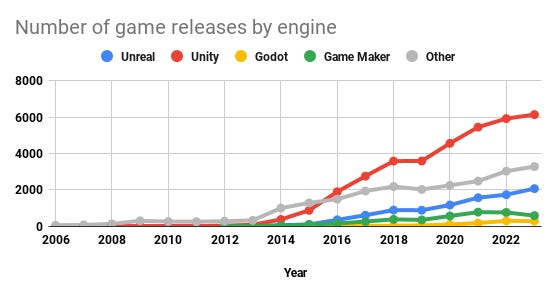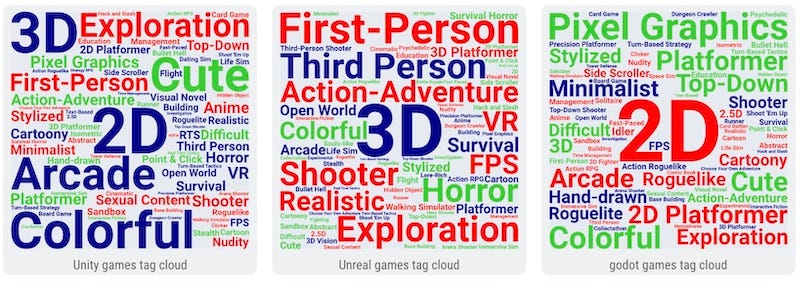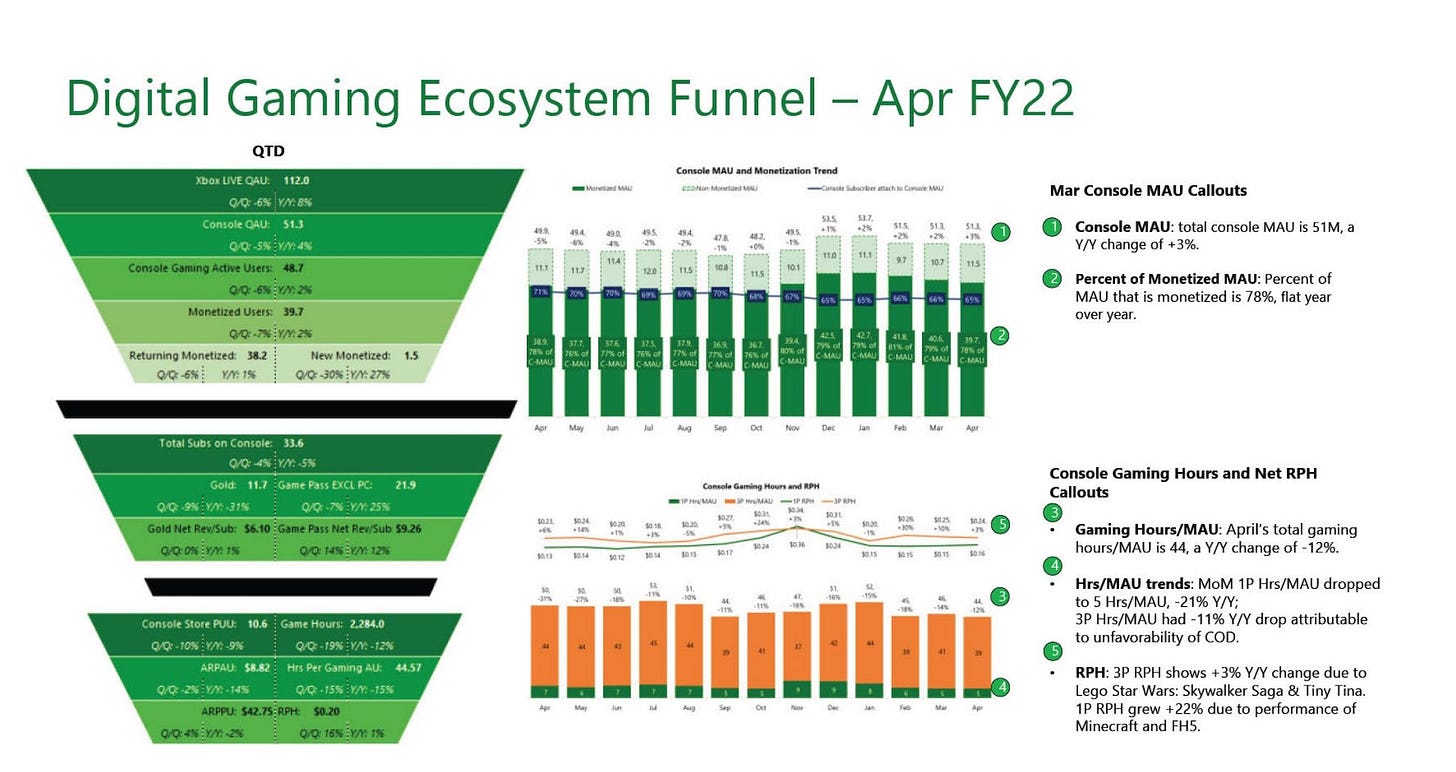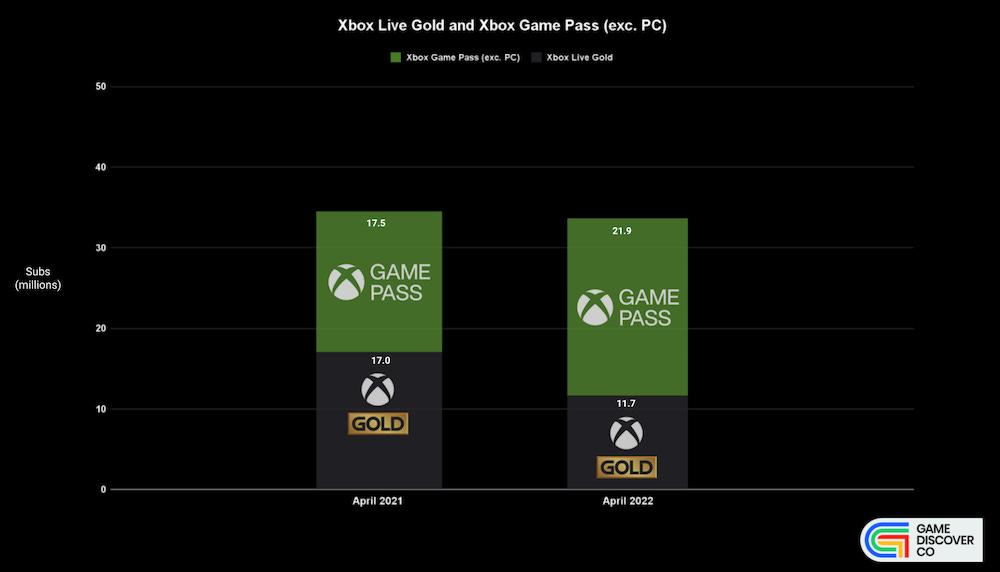In-depth: Xbox Game Pass & the 'subscriber shuffle'
Publikováno: 25.9.2023
Why sub milestones aren't always straightforward. Also: engine revenues & lots of news.
[The GameDiscoverCo game discovery newsletter is written by ‘how people find your game’ expert & company founder Simon Carless, and is a regular look at how people discover and buy video games in the 2020s.]
We’re back, folks, with a whole bunch of data to lob in your direction on a delightful Monday. Hope you had a restful weekend, and not too many pivot tables swam around in front of your eyes as you slept. (Our dreams? Soundtracked by Kenny Rogers.)
Oh, and breaking news of the day isn’t that Hideki Kamiya (Devil May Cry/Bayonetta) is leaving Platinum Games - maybe for a Chinese-funded dev a la Nagoshi. It’s actually that his underpants are ‘torn to a degree that I’ve never seen before’. (Ugh, Kamiya!)
[REMINDER: our upgraded Plus Steam data suite is here, and you can subscribe to Plus now to get full access to it, weekly PC/console sales research, an exclusive Discord, six (!) detailed game discovery eBooks - & lots more. Check out this newsletter for details on new features.]
Xbox Live Gold, Game Pass: an upcoming ‘big win’!
There sure has been a lot of chatter about the ‘FTC vs. Microsoft’ case disgorging lots of leaks on Xbox’s upcoming product plans, huh? For anyone who missed it, Gematsu has a lot of the biggest news - console & controller refreshes, etc - summed up here.
We’ve got to be honest, we agree with Phil Spencer - a lot of this info is definitely a bit out of date, skewed by corporate context, or just plain ‘aspirational thinking’. And it’s weird to be rooting around in (intended to be private) MS internal emails.
(Also, rather than pointing the finger at Microsoft or its lawyers (directly) or the FTC (indirectly), can we also call out Adobe for its weird/dumb ‘attached files that only show up in certain PDF browsers’ feature functionality that helped this leak happen? Sigh.)
Before this all went down, though, we got fixated on a particular doc which was ‘official’, and shows actual performance of the Xbox market - more our jam than speculation. It’s part of Xbox’s April 2022 internal results, which was 98% redacted. But weirdly, one or two slides weren’t blanked out, including this one:
Could this really be a complete dashboard of Xbox’s internal performance from April 2021 to April 2022? Yes, it could. Do we only understand about 70% of the acronyms? Also yes! (PUU and ARPAU are too arcane for even us - but some of you will get it.)
Anyhow, while you squint and zoom in, let’s try to sum up a couple of the most interesting things in this slide (and elsewhere in the doc):
Console sell-through in April 2022 was 75% Series S, 25% Series X: this data was on another (otherwise redacted) slide - but remember that there was a Series X hardware shortage throughout 2022. So long-term, it may skew closer to Xbox’s forecast for that month, which is 65% Series S, 35% Series X.
Xbox console ‘monthly actives’ in April 2022 was 51 million: a decent number, and directly comparable to PlayStation’s 106 million MAU in March 2022. (Xbox does also have a lot of PC players using Xbox Live logins, which is how it gets to 120 million MAU in Holiday 2022. That stat is 112 million, as of the above slide.)
First/third party playtime split is heavily in favor of third parties: we’re sure this is different now Starfield shipped. But in April 2022, Xbox first-party games were being played for 5 hours per Monthly Active User, and third-party games were played for 39 hours per MAU. (So third-party is 87% of the playtime.)
So that’s all pretty interesting - nothing too crazy in here. Playtime was down 12% year on year across the Xbox console ecosystem, as of April 2022. But with the COVID gaming boom still raging in 2021, then subsiding, that’s not necessarily a red flag.
However, there was one stat that surprised us. And this goes back to something we’ve discussed before. PlayStation and Nintendo are largely ‘guileless’ when displaying subscriber numbers and other stats, but Xbox often finds ‘clever’ ways to report.
We know that Sony reported its PlayStation Plus subscribers automatically and regularly until recently, as part of financial reporting. Their ‘pay for multiplayer’ service has always been called PlayStation Plus. It’s stalled - it’s been hanging around 45-47 million since 2020. And they just stopped reporting it quarterly, in fact.
But Game Pass subscribers are only announced in big milestones, and seldom. (The last was 25 million, including PC Game Pass subs, back in January 2022. It looks like there were really 25.9 million at that time.) So how is Xbox getting those increases, when Sony is having more trouble growing? Let’s present a graph:
It turns out that total paid console subscriptions for Xbox were actually down slightly (5%) between April 2021 and April 2022, to 33.6 million. But since Xbox Live Gold isn’t included in Game Pass totals, Microsoft can keep converting Live Gold subscribers to Game Pass* to boost its GP numbers. (*Not all are conversions, of course.)
So maybe you see our point on metrics? Sony just reports all its PlayStation Plus ‘formerly pay for multiplayer’ subscriptions transparently (yay!), and sees stagnation. But Xbox shows ‘growth’ by reporting its paid console subs cleverly. (Game Pass is also growing in PC, which Sony doesn’t have, but it’s a small percentage of the total.)
And there’s a capper on this - did you work it out yet? Xbox Live Gold is now Game Pass Core, and so all its subscriptions can now be counted as Game Pass! So you’re very likely to see Xbox report it has more than 30 million Game Pass subs in the near few weeks/months.
Huh? Well, Xbox looks to have had stagnating overall console subscriber numbers, as much as PlayStation has. If it changed Live Gold’s name back in 2021, it would have had close to 35 million ‘Game Pass subscribers’. But better for optics to upsell Gold into higher-tier Game Pass subs, and then rename later. (Clever girl, Xbox, clever girl.)
Unity: the new deal & how engines rank on Steam!

We’re expecting you have spotted this, but predominant PC/console game engine Unity has apologized and changed a number of its licensing terms, after introducing PTSD into a largish percentage of PC/console devs over new ‘per-download’ fees.
Summing up the changes, which are substantial, but don’t affect the sense of distrust that many now have for the company:
Unity Personal plan stays free, with the ‘you don’t need to upgrade or pay’ threshold below $200k revenue in the last 12 months AND 200k lifetime downloads.
You now get “a choice of either a 2.5% revenue share or the calculated amount based on the number of new people engaging with your game each month.” (The 2.5% is on gross - so on Steam, it’ll be ≈4.2% of your net revenue after Valve cut, refunds, etc.)
The company has abandoned the concept of monitoring installs themselves, saying: “Both of these [above] numbers are self-reported from data you already have available. You will always be billed the lesser amount.”
These fees will now only be payable with games that ship with “the next LTS [long term stable] version of Unity shipping in 2024 and beyond” - which is not LTS 2024, btw, as Brandon Sheffield spotted, it’s LTS 2023. (A marginal gotcha.)
As we said in our original Unity piece, “most small and medium PC & console devs won’t be [financially] affected significantly by these biz model changes.” (Though the concept of paying a percentage of revenue for an engine product may offend?) These newer fixes make things ‘better’ for small devs, but have added complexity, not to mention the major issue of devs accurately calculating ‘new people engaging with your game’.
(So: does a Humble or EGS ‘free game’ key redemption - without someone playing the game - count as ‘engaging’ with it? Will Xbox and PlayStation need to provide devs transparent monthly data on Game Pass/PS+ downloads? They currently do not.)
Unity Create president Marc Whitten cannily noted in a Wired interview about developer trust: “I can’t tell you that you should trust me. You have to decide that on your own.” The million dollar question! So let’s enumerate - what size of devbase is at stake?

Extending the great SteamDB work to automagically detect game engine types with Steam apps, GameDiscoverCo’s own Data Fellow, Strahinja took a look into engine market share over time (above). As you can see, in 2023, Unity has triple the market share of Unreal (which itself has a self-reported ‘5% of gross over $1 million LTD’ fee.)
Strahinja notes: “the number of Unity games increased by only 8% compared to last year. The number of Unreal games increased by 10%, while the number of Godot games increased by as much as 69%!” (From a low base, of course!)
How about total lifetime Steam revenue per engine, across all games ever released on it, then? The results are as follows:
We know that Unreal is used for AAA titles more often. So it makes sense that the top 10% of all Unreal games make >$200k gross lifetime on Steam, with the biggest in the 8 or 9 figures. (Whereas Unity’s top 10% make ‘just’ >$100k gross, with many, but somewhat less top-end outliers. And Godot’s top 10%? Only >$12k gross.)
Finally - how about a Steam tag cloud for Unity vs. Unreal vs. Godot? That goes pretty much as you’d expect - with Unity combining ‘all types of game’, vs. Unreal’s ‘3D action-adventure’ specialty and Godot’s current ‘smaller 2D game’ focus:

It’s not going to be easy for many teams to move off of Unity. The sheer amount of inexpensive, incredibly useful Unity Asset Store plug-ins augment an already well-built out engine. (Try recoding Rewired’s game controller functionality for, uh, $45.)
But Unity’s ongoing $ focus on a) the F2P-centric mobile market b) engine usage beyond games (ideally funded by multinationals that can spend a lot?) means that there are plenty of new yearnings for another up-to-par engine. Will they be satisfied?
The game discovery news round-up..
Starting off the week strong, here’s a look at all the game discovery and platform news that’s fit to print, starting with the following:
Who did you say got added to Valve’s official Steamworks marketing page last week at the top of the ‘Learn from other devs’ section? Oh, it’s us! (Seriously, thanks to all the devs who’ve worked on case studies with us - you’re the MVPs.)
Sony’s really gunning for its ‘25 million PS5s sold this fiscal year’milestone, and the latest push is a free game for all new PS5 owners who activate before Oct. 20th, including “12 of Sony's best-selling exclusives like God of War Ragnarok, Horizon Forbidden West and Marvel's Spider-Man Miles Morales.”
The Microsoft x Activision acquisition is trundling to a successful end, as the UK’s Competition & Markets Authority OK-ed the ‘sell ATVI cloud gaming rights to Ubisoft’ move, the last barrier. (On LinkedIn, antitrust lawyer Ronan Scanlan explains why this weird ‘logic loop’ is “the right outcome, for all the wrong reasons.”)
Four very helpful PC/console game publisher lists: Alan’s guide(which also includes localization, porting & QA), Seyed’s publisher database(for premium PC/console games only), Liam Twose’s Global Games Industry Guide (wider, also includes publishers), IndieGameBusiness’ publisher list(across PC, console, mobile, VR.)
Two fun Valve things: first, an article on ‘why Valve is a wonderful upstream contributor to Linux & the open-source community’ with SteamOS & beyond. Second, the HackerNews discussion of the article highlights ex-Valve staffer Chet Faliszek answering TikTok questions re: how the company’s flat hierarchy (used to) work.
However, there’s always signs that publishers are trying to build their own mini subscription fiefdoms. Rockstar’s ‘GTA Plus’ subscription, which is $6.99/month and includes in-game GTA Online cash & perks, is now “adding a rotation of classic Rockstar Games titles”, starting with GTA 3’s Definitive Edition remasters.
We spotted ‘aquarium idle game’Chillquarium as an above-average Steam performer a few weeks back, so it’s great to see the dev do an honest postmortem of his overperformance, as his “two-year Godot hobby project… managed to beat the odds and sell over 15,000 copies in its first week.”
While we’re not getting deep into those Xbox email leaks (see above), this March 2020 Phil Spencer musing is probably the most interesting - and least skewed - of the lot: “The AAA game publishers, starting from a position of strength driven from physical retail have failed to create any real platform effect for themselves.”
What are key mobile F2P hypercasual game publishers doing? Pivoting into ‘live-ops’ games, and Matej Lancaric has a great profile of My Perfect Hotel, which is “a (hybrid) casual game where you’re in charge of managing a hotel complex” and scaled paid UA to get 13 million installs in one month (!) recently.
Steam things: the early 2024 ‘themed’ sales are now officially confirmed, including Capitalism & Economy Fest and Dinos vs. Robots Fest, woo; the top new Steam games & DLC of August 2023 got their own sales page, including a $30 Icarus expansion and big games like Sunkenland and Marvel Snap’s 1.0 release.
Finally, while cleaning out our Little Free Library, I found someone had dropped off a copy of encyclopedia firm Grolier’s ancient ‘Book Of Knowledge Annual 1969’ in there. Could there conceivably be any video game link-up to this fact?
Of course there could! Its ‘culture’ section includes the first U.S. showing of the ‘world’s first interactive movie’, the Kinoautomat (right), which is so much like a Sam Barlow game that this academic blog mentions it and Her Story in the same breath:
(Bonus link: the 1998 European-only PlayStation game Tank Racer, my first ‘lead designer’ credit on a video game, was published by… Grolier Interactive! In 2000, Grolier got bought by kids book powerhouse Scholastic & ceased funding games…)
[We’re GameDiscoverCo, an agency based around one simple issue: how do players find, buy and enjoy your PC or console game? We run the newsletter you’re reading, and provide consulting services for publishers, funds, and other smart game industry folks.]




